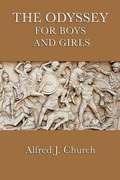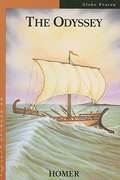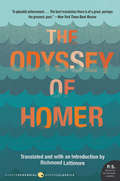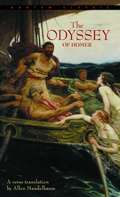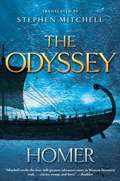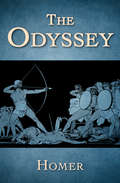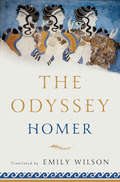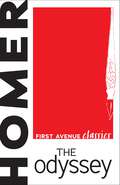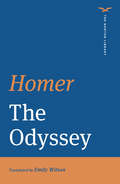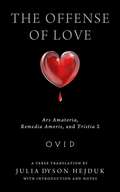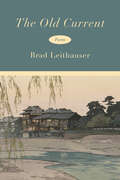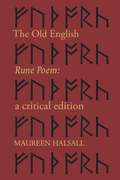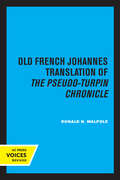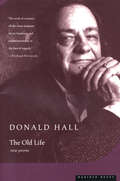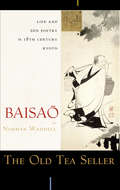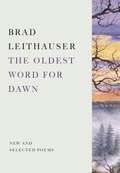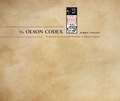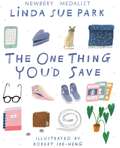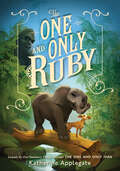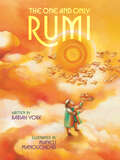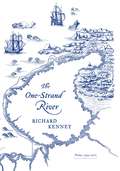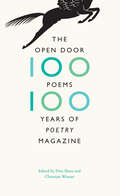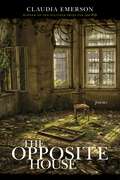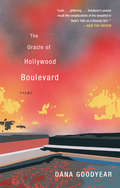- Table View
- List View
The Odyssey for Boys and Girls
by Alfred J. ChurchThe Odyssey is literature's grandest evocation of every man's journey though life. The poem centers on the Greek hero Odysseus and his long journey home after the fall of Troy. It takes Odysseus ten years to reach Ithaca after the ten-year Trojan War. Odysseus survives storm and shipwreck, the cave of the Cyclops and the isle of Circe, the lure of the Sirens' song, and a trip to the Underworld, only to find his most difficult challenge at home, where treacherous suitors seek to steal his kingdom and his loyal wife, Penelope. The Odyssey is Homers' sequel to the Iliad.
The Odyssey of Homer ( An Adapted Classic)
by Homer Henry I. ChristHomer's great epic describes the many adventures of Odysseus, Greek warrior, as he strives over many years to return to his home island of Ithaca after the Trojan War. His colorful adventures, his endurance, his love for his wife and son have the same power to move and inspire readers today as they did in Archaic Greece, 2800 years ago.
The Odyssey of Homer (Harper Perennial Modern Thought Ser.)
by Homer Richmond LattimoreThe most eloquent translation of Homer's Odyssey into modern English. [This text is listed as an example that meets Common Core Standards in English language arts in grades 9-10 at http://www.corestandards.org.]
The Odyssey of Homer: According To The Text Of Wolf; With Notes, For The Use Of Schools And Colleges (classic Reprint)
by HomerHomer's epic chronicle of the Greek hero Odysseus' journey home from the Trojan War has inspired writers from Virgil to James Joyce. Odysseus survives storm and shipwreck, the cave of the Cyclops and the isle of Circe, the lure of the Sirens' song and a trip to the Underworld, only to find his most difficult challenge at home, where treacherous suitors seek to steal his kingdom and his loyal wife, Penelope. Favorite of the gods, Odysseus embodies the energy, intellect, and resourcefulness that were of highest value to the ancients and that remain ideals in out time.In this new verse translation, Allen Mandelbaum--celebrated poet and translator of Virgil's Aeneid and Dante's Divine Comedy --realizes the power and beauty of the original Greek verse and demonstrates why the epic tale of The Odyssey has captured the human imagination for nearly three thousand years.From the Paperback edition. [This text is listed as an example that meets Common Core Standards in English language arts in grades 9-10 at http://www.corestandards.org.]
The Odyssey: (The Stephen Mitchell Translation)
by Homer Stephen MitchellFrom Stephen Mitchell, the renowned translator whose Iliad was named one of The New Yorker’s Favorite Books of 2011, comes a vivid new translation of the Odyssey, complete with textual notes and an illuminating introductory essay.The hardcover publication of the Odyssey received glowing reviews: The New York Times praised “Mitchell’s fresh, elegant diction and the care he lavishes on meter, [which] brought me closer to the transfigurative experience Keats describes on reading Chapman’s Homer”; Booklist, in a starred review, said that “Mitchell retells the first, still greatest adventure story in Western literature with clarity, sweep, and force”; and John Banville, author of The Sea, called this translation “a masterpiece.” The Odyssey is the original hero’s journey, an epic voyage into the unknown, and has inspired other creative work for millennia. With its consummately modern hero, full of guile and wit, always prepared to reinvent himself in order to realize his heart’s desire—to return to his home and family after ten years of war—the Odyssey now speaks to us again across 2,600 years. In words of great poetic power, this translation brings Odysseus and his adventures to life as never before. Stephen Mitchell’s language keeps the diction close to spoken English, yet its rhythms recreate the oceanic surge of the ancient Greek. Full of imagination and light, beauty and humor, this Odyssey carries you along in a fast stream of action and imagery. Just as Mitchell “re-energised the Iliad for a new generation” (The Sunday Telegraph), his Odyssey is the noblest, clearest, and most captivating rendition of one of the defining masterpieces of Western literature.
The Odyssey: 1
by HomerThe Ancient Greek tale of Odysseus, cursed to wander the perilous world on his epic voyage home. The decade-long Trojan War has come to an end and Odysseus, the King of Ithaca instrumental in securing victory for the Greeks, finally sets sail for home. But his adventures are far from over. Cursed by the god Poseidon to wander the earth for ten years, he must battle monstrous creatures—even facing the land of the dead—before returning to Ithaca, where still more dangers await him. In his long absence, Odysseus&’s wife, Penelope, and son, Telemachus, have endured a violent crowd of suitors who occupied the royal palace. Together with The Iliad, Homer&’s epic poem of the Trojan War, The Odyssey is one of the oldest surviving works of Western literature. Samuel Butler&’s beautiful English prose version, first appearing in 1900, remains one of the most beloved and acclaimed translations of this timeless tale. This ebook has been professionally proofread to ensure accuracy and readability on all devices.
The Odyssey: 1
by HomerA New York Times Notable Book of 2018 "Wilson’s language is fresh, unpretentious and lean…It is rare to find a translation that is at once so effortlessly easy to read and so rigorously considered." —Madeline Miller, author of Circe Composed at the rosy-fingered dawn of world literature almost three millennia ago, The Odyssey is a poem about violence and the aftermath of war; about wealth, poverty and power; about marriage and family; about travelers, hospitality, and the yearning for home. This fresh, authoritative translation captures the beauty of this ancient poem as well as the drama of its narrative. Its characters are unforgettable, none more so than the “complicated” hero himself, a man of many disguises, many tricks, and many moods, who emerges in this version as a more fully rounded human being than ever before. Written in iambic pentameter verse and a vivid, contemporary idiom, Emily Wilson’s Odyssey sings with a voice that echoes Homer’s music; matching the number of lines in the Greek original, the poem sails along at Homer’s swift, smooth pace. A fascinating, informative introduction explores the Bronze Age milieu that produced the epic, the poem’s major themes, the controversies about its origins, and the unparalleled scope of its impact and influence. Maps drawn especially for this volume, a pronunciation glossary, and extensive notes and summaries of each book make this is an Odyssey that will be treasured by a new generation of readers.
The Odyssey: 1 (First Avenue Classics ™)
by HomerOdysseus, the hero of the Trojan War, longs to return home to his kingdom in Ithaca, where a horde of suitors (who believe the long-absent Odysseus to be dead) are courting his beloved wife. Odysseus had angered the sea god, Poseidon, and for the past ten years, he's been beset by a host of challenges. The Greek hero must rely on wit, strength, and the aid of the gods of Mount Olympus to survive tumultuous storms, battles with great beasts, and the seductive powers of witches, sirens, and nymphs as he makes his way homeward. Originally written around 700 BCE, the authorship of this epic poem remains uncertain, but most scholars ascribe it to a blind Greek poet named Homer. This unabridged translation by William Cowper was originally published in 1791.
The Odyssey: 1 (The Norton Library #0)
by HomerAbout Emily Wilson’s translation “Wilson’s language is fresh, unpretentious, and lean. Even knowing the text well, I found myself rapt. Her worthy goal is always to engage readers, inviting them more deeply into the story. In this she succeeds with the skill of an ancient bard.” —MADELINE MILLER, author of Circe
The Odyssey: A Dramatic Retelling of Homer's Epic
by Simon ArmitageIn this new verse adaptation, originally commissioned for BBC radio, Simon Armitage has recast Homer's epic as a series of bristling dramatic dialogues: between gods and men; between no-nonsense Captain Odysseus and his unruly, lotus-eating, homesick companions; and between subtle Odysseus (wiliest hero of antiquity) and a range of shape-shifting adversaries―Calypso, Circe, the Sirens, the Cyclops―as he and his men are "pinballed between islands" of adversity. One of the most individual voices of his generation, Armitage revitalizes our sense of the Odyssey as oral poetry, as indeed one of the greatest of tall tales.
The Offense of Love
by Julia Dyson HejdukOvid's Art of Love (Ars Amatoria) and its sequel Remedies for Love (Remedia Amoris) are among the most notorious poems of the ancient world. In AD 8, the emperor Augustus exiled Ovid to the shores of the Black Sea for "a poem and a mistake." Whatever the mistake may have been, the poem was certainly the Ars Amatoria, which the emperor found a bit too immoral. In exile, Ovid composed Sad Things (Tristia), which included a defense of his life and work as brilliant and cheeky as his controversial love manuals. In a poem addressed to Augustus (Tristia 2), he argues, "Since all of life and literature is one long, steamy sex story, why single poor Ovid out?" While seemingly groveling at the emperor's feet, he creates an image of Augustus as capricious tyrant and himself as suffering artist that wins over every reader (except the one to whom it was addressed). Bringing together translations of the Ars Amatoria, Remedia Amoris, and Tristia 2, Julia Dyson Hejduk's The Offense of Love is the first book to include both the offense and the defense of Ovid's amatory work in a single volume. Hejduk's elegant and accurate translations, helpful notes, and comprehensive introduction will guide readers through Ovid's wickedly witty poetic tour of the literature, mythology, topography, religion, politics, and (of course) sexuality of ancient Rome.
The Old Current: Poems
by Brad LeithauserMacArthur Fellowship–winning poet Brad Leithauser returns with his first new collection in more than a decade, a collection that recalls the delicacy and intimacy of his early, award-winning volumes, and embraces the wisdom of age.As snappy as a dinner jacket&’s red silk lining, as appealing as a piano interlude in jazz, Brad Leithauser&’s robust felicity is a balm in grim times. It&’s also the perfect vehicle for nostalgia, regret, and surprise, forces that animate his first collection in more than a decade. By turns laugh-out-loud funny and deeply thoughtful, this collection balances wisdom and practicality, as with deft care Leithauser easily, often unexpectedly, juggles off-rhymes and old forms and new. The book unfolds like a five-act play, moving from chattier poems to dramatic denouements. In the collection&’s two &“Darker&” sections, we meet folks learning to say goodbye, from a three-year-old&’s cry &“I love you so loud&” (&“A Young Farewell&”) to a reckoning with words formed &“Forty-Five Years On.&” Time presses in continually. In &“Abroad&” and &“At Home,&” the author shows us himself, in younger form: sixty-six, then twenty-seven, catapulted back in memory to Tokyo by a single bite of food (&“The Old Current&”). Then, eight, and awed to remember the beauty of a lone jet overhead. With Updikean wordplay he recalls: &“Porch steps, sunset; a warm, gathering gloom. / Behind me, five lives: two parents plus the three / Brothers with whom I share my room&” (&“A Single Flight&”). As Leithauser takes the measure of a world expanding behind him, he manages to become weightless, freer, wild again. He also refuses to give up second chances. In the &“Lighter&” interlude, we chance upon &“Icarus and His Kid Brother.&” We&’re treated to dactyls and lively quatrains, a sloppy kiss that&’s not quite bliss, musings on sobriety, and what comes to pass when &“life turns lickerish and liquory&” (&“Double Dactyls,&” &“Six Quatrains,&” &“The Muses,&” and &“Kisses After Novocaine&”). The energies yoked within Leithauser&’s formalism overflow formality. Often elegiac and yet packed with humor, contemplative, consoling, and informed by the soul of a storyteller, Brad Leithauser&’s latest book of poetry is a warming, enrapturing read that returns us to the ebbs and flows of life&’s shores. &“I&’m sixty-six,&” the author writes, &“and could anything / Reliably be more heartening / Than stray hints that life&’s brightest events. / Are, however far-flung, strung / Along a long old current?&”
The Old English Rune Poem: A Critical Edition (McMaster Old English Studies and Texts)
by Maureen HalsallThis critical edition provides unique access to a work which has challenged scholars and students alike. The book is the first to deal fully with the poem as literature and to supply the runic background necessary for an understanding of the raw materials with which the poet was working. The introduction offers a thorough discussion of the origin, development, and uses of runes before proceeding to the close examination of text, language, literary sources, style, and themes of the poem. Following the text and translation of the poem proper, detailed explanatory notes pay particular attention to the background of each individual rune and rune name, and the appendixes provide analogous material to assist in setting the poet's achievement into the runic context. Since many of the sources necessary for an accurate assessement of the Old English Rune Poem are written in foreign or dead languages, modern English translations have been provided throughout to ensure that the poem will be accessible to students as well as to professional medievalists. (McMaster Old English Studies and Texts 2)
The Old French Johannes Translation of the Pseudo-Turpin Chronicle: A Critical Edition
by Ronald N. WalpoleThis title is part of UC Press's Voices Revived program, which commemorates University of California Press’s mission to seek out and cultivate the brightest minds and give them voice, reach, and impact. Drawing on a backlist dating to 1893, Voices Revived makes high-quality, peer-reviewed scholarship accessible once again using print-on-demand technology. This title was originally published in 1976.
The Old Life: New Poems
by Donald HallFor nearly forty years, Donald Hall has stood in the front rank of American poets. The title poem, an autobiographical sequence, takes Hall from his boyhood to his growing acquaintance with poets--seniors like Robert Frost and contemporaries like Robert Bly. It sees him growing into manhood, fatherhood, grandfatherhood, and a happy second marriage. When his life inevitably moves into vicissitude, even tragedy, he will tell the dreadful truth about himself and the challenges of his time on earth.
The Old Tea Seller: Life and Zen Poetry in 18th Century Kyoto
by BaisaoPoet, Zen Buddhist priest, renowned thinker, and seller of tea — Baisao was all of these things, as well as being a bit of an eccentric. Known to carry large wicker baskets filled with tea utensils through the streets and surrounding hills of Japan's capital, Baisao set up shop wherever he ended up and brewed tea for those who came to enjoy the scenery with him. Establishing a quiet, simple life, Baisao spent his final years composing poetry, brewing tea, and teaching Zen, in the process becoming a well–loved figure. These poems, memoirs, and letters tell us more about this endearing person and trace his long life's profound spiritual journey. This comprehensive translation includes nearly all of Baisao's writings, giving us a deep look at this remarkable man.
The Oldest Word for Dawn: New and Selected Poems
by Brad LeithauserFrom one of our most universally admired poets: a generous selection from his five acclaimed books of poetry, and an outstanding group of new poems. From the outset, Brad Leithauser has displayed a venturesome taste for quirky patterns, innovative designs sprung loose from traditional forms. In The Oldest Word for Dawn, we encounter a sonnet in one-syllable lines ("Post-Coitum Tristesse"), a clanging rhyme-mad tribute to the music of Tin Pan Alley ("A Good List"), intricate buried rhyme schemes ("In Minako Wada's House"), autobiography spun through parodies of Frost and Keats and Omar Khayyám ("Two Summer Jobs"). In a new poem, "Earlier," the poet investigates a kind of paradox: What is the oldest word for dawn in any language? The pursuit ultimately descends into the roots of speech, the genesis of art. "Earlier" is part of a sequence devoted to prehistoric themes: the cave paintings of Altamira, the disappearance of the Neanderthals, the poet's journey with his teenage daughter to excavate a triceratops skeleton in Montana . . . The author of six novels as well, Leithauser not surprisingly brings to his verse a flair for compelling narrative: a fateful romantic encounter on a streetcar ("1944: Purple Heart"); the mesmerizing arrival of television in a quiet Detroit neighborhood ("Not Lunar Exactly"); two boys heedlessly, joyfully bidding permanent farewell to a beloved sister ("Emigrant's Story"). The Oldest Word for Dawn reveals Brad Leithauser as a poet of surpassing tenderness and exactitude, a poet whose work, at sixty, fulfills the promise noted by James Merrill on the publication of his first book: "The observations glisten, the feelings ring true. These poems by a young, unostentatious craftsman are made to something very like perfection. No one should overlook them."
The Olson Codex: Projective Verse and the Problem of Mayan Glyphs (Recencies Series: Research and Recovery in Twentieth-Century American Poetics)
by Dennis TedlockThis exploration of the influence of Mayan hieroglyphics on the great American poet Charles Olson (1910–1970) is an important document in the history of New World verse. Olson spent six months in the Yucatan in 1951 studying Maya culture and language, an interlude that has been largely overlooked by students of his work. Like Olson and Robert Creeley, Olson&’s disciple who published Olson&’s letters from Mexico, the poet Dennis Tedlock taught at the University of Buffalo. Unlike his two predecessors, Tedlock was also a scholar of Maya language and culture, renowned for his translations from indigenous American languages, notably the Popul Vuh, the Maya creation story. In The Olson Codex, Tedlock describes and examines Olson&’s efforts to decipher Mayan hieroglyphics, giving Olson&’s work in Mexico the place it deserves within twentieth-century poetry and poetics.
The One Thing You'd Save
by Linda Sue ParkIf your house were on fire, what one thing would you save? Newbery Medalist Linda Sue Park explores different answers to this provocative question in linked poems that capture the diverse voices of a middle school class. Illustrated with black-and-white art. <P><P>When a teacher asks her class what one thing they would save in an emergency, some students know the answer right away. Others come to their decisions more slowly. And some change their minds when they hear their classmates’ responses. A lively dialog ignites as the students discover unexpected facets of one another—and themselves. With her ear for authentic dialog and knowledge of tweens’ priorities and emotions, Linda Sue Park brings the varied voices of an inclusive classroom to life through carefully honed, engaging, and instantly accessible verse.
The One and Only Ruby
by Katherine ApplegateFrom beloved powerhouse author Katherine Applegate comes The One and Only Ruby, starring the adorable baby elephant from the Newbery Medal-winning modern classic The One and Only Ivan and its bestselling sequel, The One and Only Bob. Ruby’s story picks up a few months after the events of The One and Only Bob. Now living in a wildlife sanctuary, Ruby’s caretaker from the elephant orphanage in Africa where she grew up is visiting. Seeing him again brings back a flood of memories both happy and sad of her life before the circus, and she recounts the time she spent in the African savannah to Ivan and Bob.In the timeless way that only Katherine Applegate could craft, this highly anticipated novel in verse is the perfect mix of heartfelt and humorous, poignant and sweet. Artist Patricia Castelao returns to the world of Ivan and his friends with gorgeous black-and-white interior illustrations to complete the story.The One and Only Ruby features first-person narrative; author's use of literary devices (personification, imagery); and story elements (plot, character development, perspective).This middle grade novel is an excellent choice for tween readers in grades 5 to 8, for independent reading, homeschooling, and sharing in the classroom.Don’t miss the film adaptation of The One and Only Ivan, now streaming on Disney+!
The One and Only Rumi
by Rabiah YorkThe inspiring story of Rumi&’s journey from a young refugee to a renowned poet shows how his childhood helped shape his poetry.Young Muhammad adores his home, and he loves waking up each day to the sound of birds singing. His father encourages him to keep singing through happy days as well as sad—just like the birds. And there are indeed sad days ahead when his family is forced to flee from Genghis Khan&’s army, becoming refugees. As they travel, Muhammad takes many lessons from nature, and his positivity and spirit of largess lights the way.This moving story based on the life of the beloved thirteenth-century poet Rumi celebrates showing love to everyone and offers a beautiful message of hope in troubled times.
The One-Strand River: Poems, 1994-2007
by Richard KenneyFourteen years after his last book of poems, we have a glorious new volume from Richard Kenney, who has been hailed byThe New York Review of Booksas “one of the most gifted and multifaceted and original of American poets. ” InThe One-Strand River, Kenney has tales to tell—of loves, births, and confounding politics—in lively, quicksilver language that surprises at every turn. We meet the poet as a middle-aged husband walking the dog, confiding, “Churlish / thoughts bedevil me, often. Sunshine; girls / half my age; the future; unseen perishing / armies. ” He swings between surreal dawn vistas and the unsettling sight of seventh-grade girls circling his teenage son; between the pleasure of a New Year’s celebration “with Nipperkin” and—striking a note that is rare in contemporary poetry—satirical attack, with an eye on the news of the day. A master of many tones, Kenney recalls a nursery rhyme in the title poem—“Gray goose and gander/ How long have we together?”—and ponders the “one-strand river” that is the sea, with its one encircling shore and its tidal pull on both the landscape and the human heart. Kenney is never a confessional poet, yet we meet a powerful mind here—that of a man who is always responding to provocations seen and unseen, taking pleasure in the possibilities of words themselves, tossing them up into the daily storm of our vexations and our perilous happiness. From the Hardcover edition.
The Open Door: One Hundred Poems, One Hundred Years of Poetry Magazine
by Don Share Christian WimanWhen Harriet Monroe founded Poetry magazine in Chicago in 1912, she began with an image: the Open Door. "May the great poet we are looking for never find it shut, or half-shut, against his ample genius!" For a century, the most important and enduring poets have walked through that door--William Carlos Williams and Wallace Stevens in its first years, Rae Armantrout and Kay Ryan in 2011. And at the same time, Poetry continues to discover the new voices who will be read a century from now. Poetry's archives are incomparable, and to celebrate the magazine's centennial, editors Don Share and Christian Wiman combed them to create a new kind of anthology, energized by the self-imposed limitation to one hundred poems. Rather than attempting to be exhaustive or definitive--or even to offer the most familiar works--they have assembled a collection of poems that, in their juxtaposition, echo across a century of poetry. Adrienne Rich appears alongside Charles Bukowski; poems by Isaac Rosenberg and Randall Jarrell on the two world wars flank a devastating Vietnam War poem by the lesser-known George Starbuck; August Kleinzahler's "The Hereafter" precedes "Prufrock," casting Eliot's masterpiece in a new light. Short extracts from Poetry's letters and criticism punctuate the verse selections, hinting at themes and threads and serving as guides, interlocutors, or dissenting voices. The resulting volume is an anthology like no other, a celebration of idiosyncrasy and invention, a vital monument to an institution that refuses to be static, and, most of all, a book that lovers of poetry will devour, debate, and keep close at hand.
The Opposite House: Poems (Southern Messenger Poets)
by Claudia EmersonWith graceful lines swooping like a bird in flight, Claudia Emerson's newest collection explores the harsh realities of aging and the limitations of the human body, as well as the loneliness, fear, and anger that can accompany us as we live. Keenly observed and beautifully executed, these poems move from the grim façade that hides beauty-prosthetic eyes- to the beautiful scene that conceals violence-a rural retreat. Emerson also considers once common things that are fast becoming obsolete: cursive writing, telephone booths, barbers. At once hopeful and cognizant of all the reasons why humans might despair, these poems echo with remarkable insight into the true nature of life.
The Oracle of Hollywood Boulevard: Poems
by Dana GoodyearPoems about sex, marriage, and the desire for a child from a "scary-cool and edgy-smart" poet (J. D. McClatchy). The frank, raw lyrics of Dana Goodyear's second collection draw on the scenery of Los Angeles--the teenagers, vagrants, pornographers--and the beautiful decay that serves as an insistent reminder to them all. The poems are unsparing but tender, candid but sly, and open to the force of nature on an individual human life. from "Wildfire" We want this. The end to sleeping, the bittersweet arousal, the peeling back, the soft bath in resin, the release. It can't come quick enough, the hot touch that breaks the crust and lets us go. Hear it now: a crackling, as the woods begin to sing alongside the birds.
